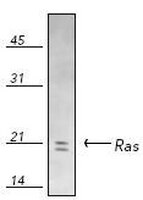553571 Sigma-AldrichAnti-Ras (31-43) Rabbit pAb
This Anti-Ras (31-43) Rabbit pAb is validated for use in Immunoblotting for the detection of Ras (31-43).
More>> This Anti-Ras (31-43) Rabbit pAb is validated for use in Immunoblotting for the detection of Ras (31-43). Less<<Synonyms: Anti-Ras GDP/GTP Binding Protein
Recommended Products
Overview
| Replacement Information |
|---|
Key Specifications Table
| Species Reactivity | Host | Antibody Type |
|---|---|---|
| B, H, M, R | Rb | Polyclonal Antibody |
Pricing & Availability
| Catalog Number | Availability | Packaging | Qty/Pack | Price | Quantity | |
|---|---|---|---|---|---|---|
| 553571-50UG |
|
Plastic ampoule | 50 μg |
|
— |
| References | |
|---|---|
| References | Hardie, G. and Hanks, S. 1995. in The Protein Kinase Facts Book, Protein-Serine Kinases p. 418, Academic Press, San Diego, CA. Sawada, M., et al. 1989. Nucleic Acid Res. 17, 8867. |
| Product Information | |
|---|---|
| Form | Liquid |
| Formulation | In PBS, 50% glycerol, pH 7.2. |
| Positive control | Rat brain tissue |
| Preservative | ≤0.1% sodium azide |
| Quality Level | MQ100 |
| Physicochemical Information |
|---|
| Dimensions |
|---|
| Materials Information |
|---|
| Toxicological Information |
|---|
| Safety Information according to GHS |
|---|
| Safety Information |
|---|
| Product Usage Statements |
|---|
| Packaging Information |
|---|
| Transport Information |
|---|
| Supplemental Information |
|---|
| Specifications |
|---|
| Global Trade Item Number | |
|---|---|
| Catalog Number | GTIN |
| 553571-50UG | 04055977193756 |
Documentation
Anti-Ras (31-43) Rabbit pAb SDS
| Title |
|---|
Anti-Ras (31-43) Rabbit pAb Certificates of Analysis
| Title | Lot Number |
|---|---|
| 553571 |
References
| Reference overview |
|---|
| Hardie, G. and Hanks, S. 1995. in The Protein Kinase Facts Book, Protein-Serine Kinases p. 418, Academic Press, San Diego, CA. Sawada, M., et al. 1989. Nucleic Acid Res. 17, 8867. |








